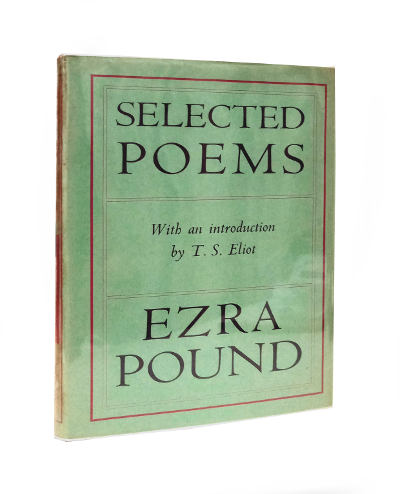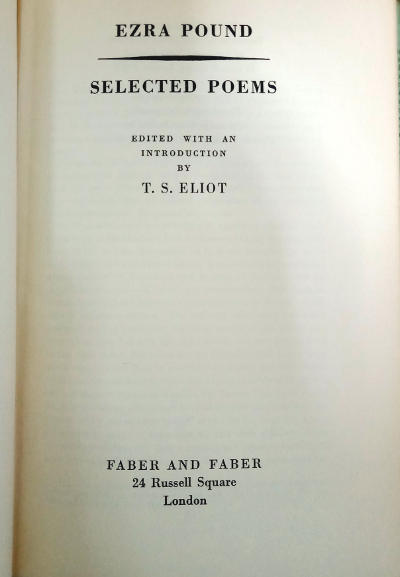Selections includes poems from Personae, Ripostes, Lustra, Cathay, Poems from Lustra, Hugh Selwyn Mauberley, and Early Poems Rejected by the Author.
Separation on the River Kiang
Ko-iin goes west from Ko-kaku-ro,
The smoke-flowers are blurred over the river.
His lone sail blots the far sky.
And now I see only the river,
The long Kiang, reaching heaven.
About the author (from Wikipedia):
Ezra Pound (30 October 1885 – 1 November 1972) was an expatriate American poet and critic, a major figure in the early modernist poetry movement, and a fascist collaborator in Italy during World War II. His works include Ripostes (1912), Hugh Selwyn Mauberley (1920), and his 800-page epic poem, The Cantos (c. 1917–1962).
Pound’s contribution to poetry began in the early 20th century with his role in developing Imagism, a movement stressing precision and economy of language. Working in London as foreign editor of several American literary magazines, he helped discover and shape the work of contemporaries such as T. S. Eliot, Ernest Hemingway, and James Joyce. He was responsible for the 1914 serialization of Joyce’s A Portrait of the Artist as a Young Man, the 1915 publication of Eliot’s “The Love Song of J. Alfred Prufrock”, and the serialization from 1918 of Joyce’s Ulysses. Hemingway wrote in 1932 that, for poets born in the late 19th or early 20th century, not to be influenced by Pound would be like passing through a great blizzard and not feeling its cold.
Angered by the carnage of World War I, Pound blamed the war on finance capitalism, which he called “usury”. He moved to Italy in 1924 and through the 1930s and 1940s promoted an economic theory known as social credit, wrote for publications owned by the British fascist Sir Oswald Mosley, embraced Benito Mussolini’s fascism, and expressed support for Adolf Hitler. During World War II and the Holocaust in Italy, he made hundreds of paid radio broadcasts for the Italian government, including in German-occupied Italy, attacking the United States, Franklin D. Roosevelt and, above all, Jews, as a result of which he was arrested in 1945 by American forces in Italy on charges of treason. He spent months in a U.S. military camp in Pisa, including three weeks in an outdoor steel cage. Deemed unfit to stand trial, he was incarcerated in St. Elizabeths psychiatric hospital in Washington, D.C., for over 12 years.
While in custody in Italy, Pound began work on sections of The Cantos that were published as The Pisan Cantos (1948), for which he was awarded the Bollingen Prize for Poetry in 1949 by the Library of Congress, causing enormous controversy. After a campaign by his fellow writers, he was released from St. Elizabeths in 1958 and lived in Italy until his death in 1972. His political views have ensured that his life and work remain controversial.



